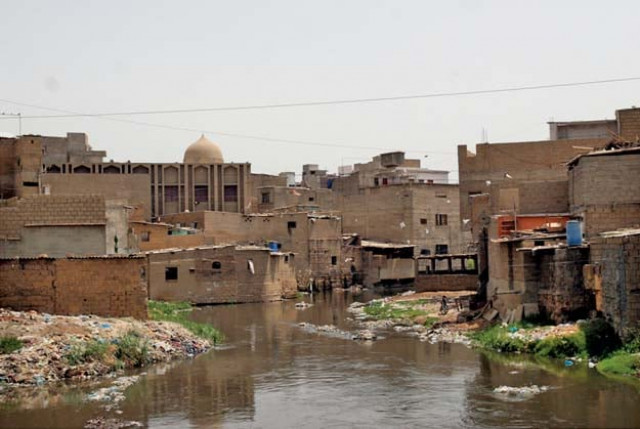Karachi and the context of climate change
The biggest concern is the urban-based contributing factors responsible for altering the global climate

Slums and hill settlements are exposed to flooding in the absence of protection and emergency response systems. PHOTO COURTESY: FARHAN ANWAR
The biggest concern is the urban-based contributing factors responsible for altering the global climate and the impacts on the urban settlements themselves. This concern is based on pure statistics. About 50 per cent of the global population resides in cities now and by the year 2050, the anticipated urban population load will be up to 75 per cent of the global population. It therefore comes as no surprise that the whole paradigm of urban planning has changed, from comprehensive to strategic planning and for designing, developing and sustaining smart and green cities. Climate change is the main trigger to this rapidly evolving urban phenomenon.
The capacity context for adapting to possible climate change scenarios in Karachi is grim. While Karachi still serves as the commercial backbone of Pakistan, there is increasing socioeconomic disparity and growing environmental degradation. Human settlements such as slums and hill settlements are exposed to fluvial, stormwater flooding risks and hill torrents in the absence of appropriate protection and emergency response systems.
Besides the Malir river embankment, there are no provisions for flood defences because drainage channels are mostly choked. There is no provision of flood storage areas. The livelihoods of significant human settlements based in rural Karachi goths are dependent on farming, mostly using groundwater. The groundwater table is already decreasing and aquifers are threatened due to human activities such as sand extraction. Energy consumption is increasing and no efforts are being taken to promote energy conservation. Due to rising population density in the inner city and increased traffic and congestion, the likelihoods of the heat island effect taking place is quite likely. In the context of a possible sea level rise, adverse biodiversity impacts on wetlands and tidal zones and possible loss of flora and fauna can be anticipated.
Window of opportunity
The global focus on climate change and the availability of related substantial financial resources offers a window of opportunity for urban managers across the world to access the resources and plan and implement measures to not only prepare for possible climate change impacts but generally improve the sustainability profile of their cities.
Karachi, one of the fastest growing megacities in the world, can definitely make progress in this regard.
However, there are some fundamental challenges related to the larger governance and institutional framework that need to be addressed first. Understanding the political economy of the city is the first step to moving towards devising a viable strategy for reforms.
For us, this consideration offers the most critical challenge of all. Over the years, the capacity and writ of local government entities in Karachi have steadily eroded. Karachi, in effect, is a highly decentralised city in terms of control over land and provision of services. This decentralisation is manifested both officially and unofficially.
As we progress to the technical and procedural aspects of climate change adaptation, the first step is to map the exposed and vulnerable people and assets. It would be a task that would require working with probabilities, trends and translating them into marking physical jurisdictions (risk zones) and assessing risks to the people and assets located within.
Some key sectors that can be identified in Karachi may include water and sanitation, drainage, housing and land use, transportation and emergency response - emergency medicine, health care, fire services and law and order. What is needed is the initiation of a process of institutional reforms within these sectors where the new paradigm accommodates sharing of roles and responsibilities in terms of financing and provisioning of critical civic services between the public and private sectors and communities.
The writer is an urban planner and runs a non-profit organization based in Karachi city focusing on urban sustainability issues
Published in The Express Tribune, March 16th, 2015.

















COMMENTS
Comments are moderated and generally will be posted if they are on-topic and not abusive.
For more information, please see our Comments FAQ